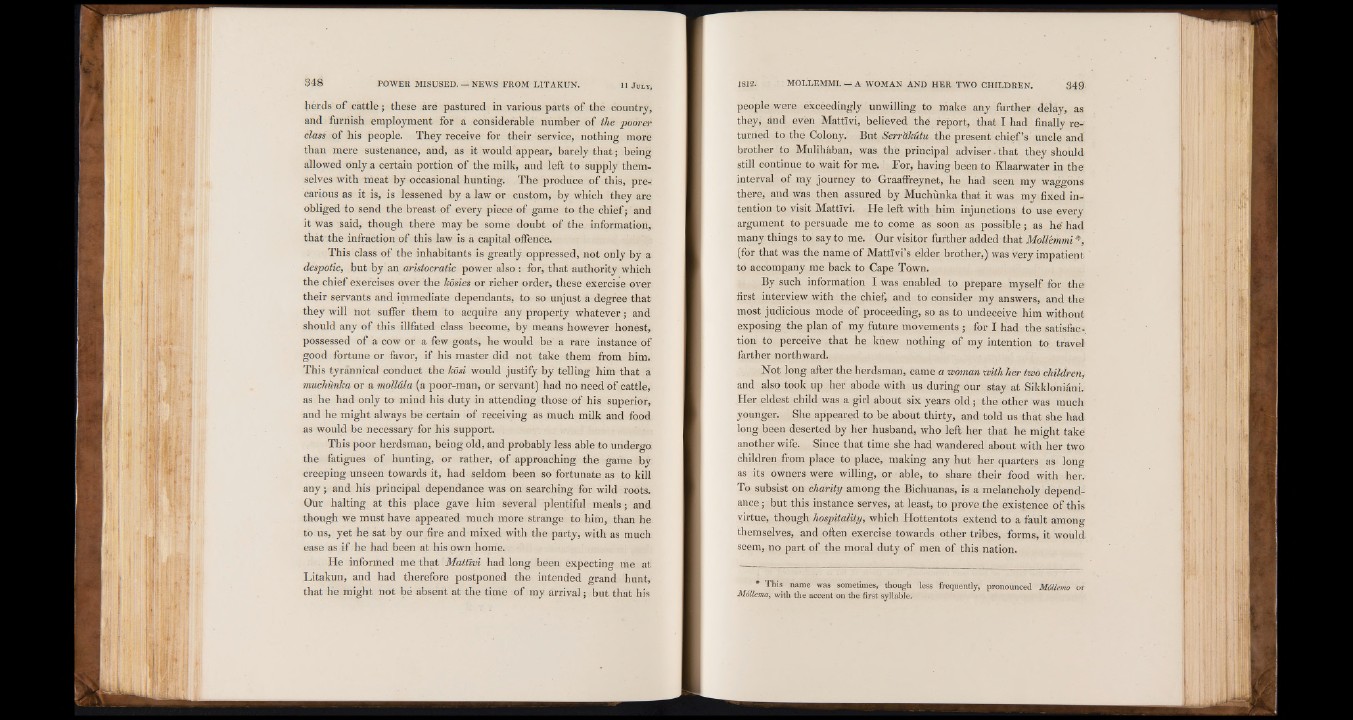
herds of cattle; these are pastured in various parts of the country,
and furnish employment for a considerable number of the poorer
class of his people. They receive for their service, nothing more
than mere sustenance, and, as it would appear, barely that; being
allowed only a certain portion of the milk, and left to supply themselves
with meat by occasional hunting. The produce of this, precarious
as it is, is lessened by a law or custom, by which they are
obliged to send the breast of every piece of game to the chief; and
it was said, though there may be some doubt of the information,
that the infraction of this law is a capital offence.
This class of the inhabitants is greatly oppressed, not only by a
despotic, but by an aristocratic power also : for, that authority which
the chief exercises over the kosies or richer order, these exercise over
their servants and immediate dependants, to so unjust a degree that
they will not suffer them to acquire any property whatever; and
should any of this illfated class become, by means however honest,
possessed of a cow or a few goats, he would be a rare instance of
good fortune or favor, if his master did not take them from him.
This tyrannical conduct the hod would justify by telling him that a
muchunka or a mollala (a poor-man, or servant) had no need of cattle,
as he had only to mind his duty in attending those of his superior,
and he might always be certain of receiving as much milk and food
as would be necessary for his support.
This poor herdsman, being old, and probably less able to undergo
the fatigues of hunting, or rather, of approaching the game by
creeping unseen towards it, had seldom been so fortunate as to kill
any; and his principal dependance was on searching for wild roots.
Our halting at this place gave him several plentiful meals; and
though we must have appeared much more strange to him, than he
to us, yet he sat by our fire and mixed with the party, with as much
ease as if he had been at his own home.
He informed me that Mattivi had long been expecting me at
Litakun, and had therefore postponed the intended grand hunt,
that he might not be absent at the time of my arrival; but that his
people were excèedingly unwilling to make any further delay, as
they, and even Mattivi, believed the report, that I had finally returned
to the Colony. But Serrâkûtu thé present chief’s uncle and
brother to Mulihâban, was the principal adviser. that they should;
still continue to wait for me. For, having been to Klaarwater in the'
interval of my journey to Graaffreynet, he had seen my waggons
there, and was then assured by Muchùnka that it was my fixed intention
to visit Mattivi. He left with him injunctions to use every
argument to persuade me to come as soon as possible; as he'had
many things to say to me. Our visitor further added that Moll'emmi *,
(for that was the name of Mattîvi’s elder brother,) was very impatient
to accompany me back to Cape Town.
By such information I was enabled to prepare myself for the
first interview with the chief, and to consider my answers, and the
most judicious mode of proceeding, so as to undeceive him without
exposing the plan of my future movements ; for I had the satisfaction
to perceive that he knew nothing of my intention to travel
farther northward.
Not long after the herdsman, came a woman with her two children,
and also took up her abode with us during our stay at Sikkloniâni.
Her eldest child was a girl about six years old ; the other was much
younger. She appeared to be about thirty, and told us that she had
long been deserted by her husband, who left her that he might take
another wife. Since that time she had wandered about with her two
children from place to place, making any hut her quarters as long
as its owners were willing, or able, to share their food with her.
To subsist on charity among the Bichuanas, is a melancholy dependance
; but this instance serves, at least, to prove the existence of this
virtue, though hospitality, which Hottentots extend to a fault among
themselves, and often exercise towards other tribes, forms, it would,
seem, no part of the moral duty of men of this nation.
* Tbis name was sometimes, though less frequently, pronounced MdUemo or
Mdllema, with the accent on the first syllable.